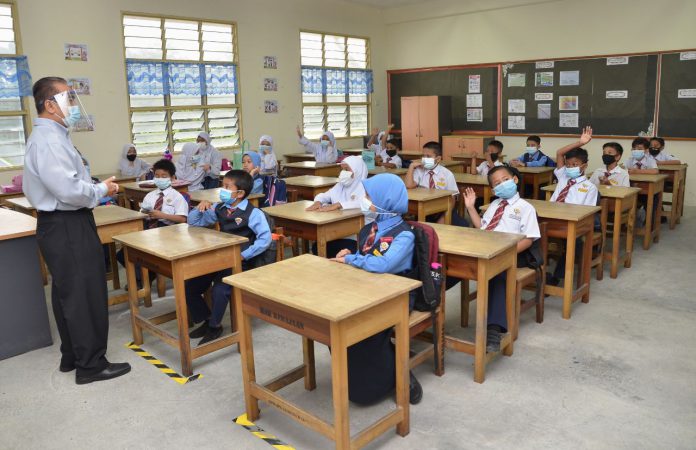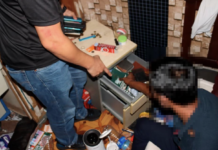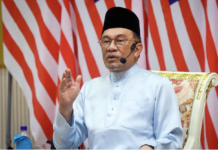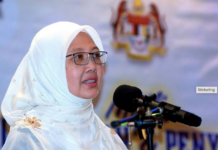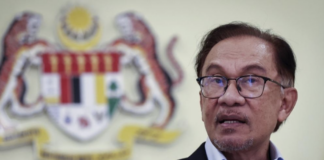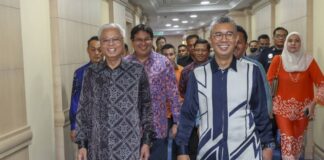KUALA LUMPUR, Sept 13 — The Education Ministry’s decision to reopen schools and allow students to attend the face-to-face teaching and learning (PdP) sessions through a weekly rotation system under the National Recovery Plan (PPN) is seen as a timely measure to restore a quality PdP process which may have been affected by school closures.
Although COVID-19 cases are still high, the reopening of schools is seen as crucial especially for students with special needs (MBK) and secondary students who will be sitting for major examinations.
Hence for these students, the face-to-face learning sessions will allow for better teaching delivery, implementation of assessment for student’s performance as well as to ensure that they will not fall behind in getting their education.
At the secondary school level, the Malaysian School Principals Council vice president Mohd Ariffin Abdul Rahman said the requirement to only allow students in examination classes to return to school would help them to prepare for their tests.
He said the face-to-face interaction between students and teachers during the PdP will help students to better understand the subjects, besides allowing educators to provide better guidance, especially subjects involving practical training.
“During PdPR (home-based teaching and learning), teachers and students face other challenges including the lack of reference materials for the students and disruption of internet coverage, but face-to-face PdP allows for more effective interaction and two-way discussions,” he said when contacted by Bernama.
He said allowing students to return to school will help them to revise the topics that have been taught during PdPR as well as speed up preparations for their examinations.
Yesterday, Senior Education Minister Datuk Seri Dr Radzi Jidin announced that schools will reopen in stages from Oct 3 and students will take turns to attend school, with attendance set at 50 per cent of the classroom capacity to reduce the risk of COVID-19 transmission.
However, Radzi said all schools in Phase One of PPN will remain closed and their students will continue with PdPR, adding that for secondary schools in states under Phase Two of PPN only Form Six second semester students, third-semester students of Sports Schools pre-university programmes and those taking international examinations as well as MBK students in primary schools will be allowed to attend school without any rotation while other primary and secondary students will continue with PdPR.
As for states in Phase 3 of the PPN, the reopening of schools will also include preschool and private kindergarten pupils without rotation, while for secondary schools, it will involve full boarding school students sitting for public examinations (without rotation) and daily or private schools sitting for public examinations (rotation), Radzi said.
For states in Phase 4, he said Years One, Two, Three will attend school on a rotational basis from Oct 17 onwards, he added, while Years Four, Five and Six will do the same, also on rotation, from Oct 31.
He added beginning Oct 17, public examination classes, Form Three and Form Four students in full boarding schools will be allowed to attend classes on a rotational basis, while those in Forms One, Two and Three in daily and private schools will attend on a rotational basis. Form One and Form Two will continue with PdPR.
The coalition of the Malaysian Headmasters Council president Sukiman Juki said the reopening of schools in stages is important to ensure that students’ mastery of their subjects is back on track especially those with special needs.
He clarified that the PdP modules of special needs students are different from the modules for normal students, as they need more two-way interactions with their teachers who employ certain skills and techniques during the sessions.
“This is a critical period in the development of children’s education for primary pupils, especially children with special needs, therefore the priority given to resume face-to-face PdP for this group is necessary to ensure that they do not fall behind,” he added.
He said the face-to-face PdP sessions on a rotational basis will also give space to the students to learn better without additional burdens on the teachers.
Although MOE will not force parents to send students to school, Mohd Ariffin and Sukiman are confident that the risk of COVID-19 infections in schools can be prevented by complying with strict standard operating procedures, adding that parents should also play a role to ensure their children are safe outside of school so that the PdP process will run smoothly.




